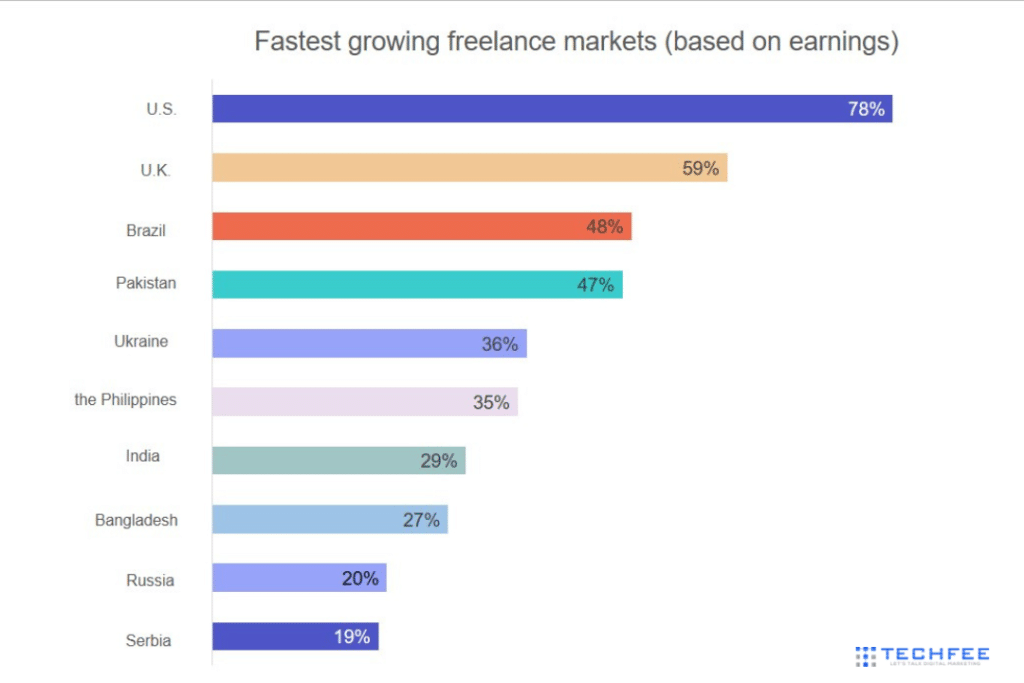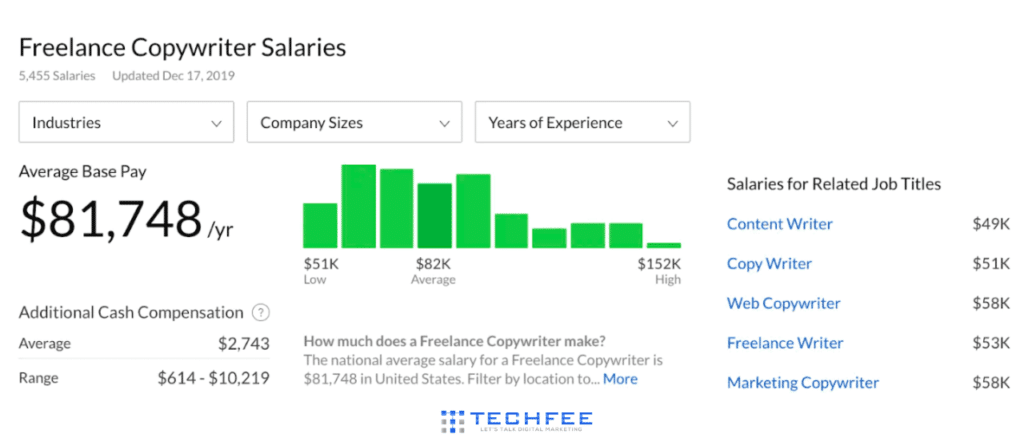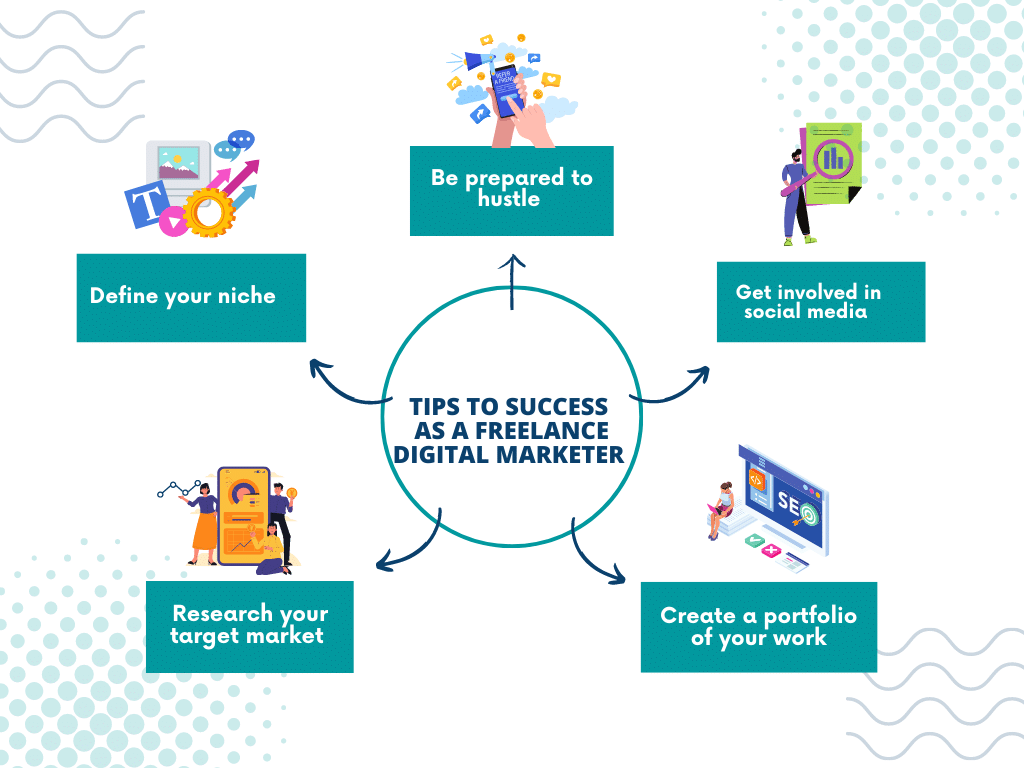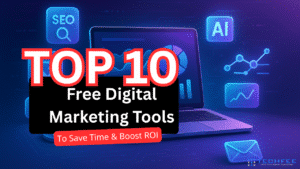Are you considering becoming a freelance digital marketer? If so, you’re in luck – this is a great time to start! In this guide, we’ll share some tips on how to become a freelance digital marketer and be successful as a freelancer.
This guide is packed with tips and advice on making it as a freelance digital marketer – from building your portfolio and finding clients to setting your rates and staying productive. We’ll also provide resources to help you learn about this exciting career field. So, what are you waiting for? Let’s get started!
What is Freelance Marketing, and How Does it Work?
Have you ever wondered how those freelance marketers get paid? Do they have some secret marketing method unknown to the general public? Freelance marketing is not that different from traditional marketing. The main difference is that a company does not employ freelance marketers; they are self-employed and work on a contract basis. This means that they are free to accept or reject any project that comes their way. As a result, freelance marketing can be a very flexible job and an excellent way to get started in the marketing field.
Freelance marketing is a type of digital marketing where businesses hire freelance marketers to promote their products or services. Freelance marketers work independently and are not employed by the companies they promote. Instead, they are paid per project or on a commission basis.
Businesses can either post freelance marketing projects online or contact freelance marketers directly. Once a company and freelance marketer have agreed to work together, the freelance marketer will create a digital marketing campaign that promotes the business’s products or services. The campaign may include the following:
- Creating and managing social media accounts.
- Developing and executing email marketing campaigns.
- Creating and placement of online ads.
A freelance marketer may promote through various online or offline channels such as social media, email marketing, search engine optimization, content marketing, or even good old-fashioned word of mouth.
After the campaign has been completed, the freelance marketer will send the business a report detailing the campaign results. Companies can then decide whether to continue working with the freelance marketer or not.
The key to being a successful freelance marketer is to build up a solid personal brand and always be hustling to find new clients. If you can do this, then you’ll be successful on your way to making a great career as a freelance marketer.

What is Digital Marketing, and What are the Benefits of Freelance Digital Marketing?
Digital marketing is a term that covers a wide range of marketing activities. It can involve anything from creating and managing a website to developing and managing online advertising campaigns. The benefits of freelance digital marketing are many. For starters, it allows businesses to reach a larger audience more quickly and efficiently than traditional marketing methods. Additionally, it will enable companies to track results and ROI much more effectively. And lastly, it allows businesses to tailor their marketing efforts to specific target audiences. So freelance digital marketing can be effective if you want to reach a wider audience or enjoy more control over your marketing budget.
Additionally, freelancers can often work flexible hours to suit their needs and work from anywhere worldwide. They can do freelance marketing jobs from home, sitting comfortably on a couch or bed. If you’re looking for an efficient and cost-effective way to market your business, freelance digital marketing is worth considering.
What Skills do You Require to be a Successful Freelance Digital Marketer?
To be a successful freelance digital marketer, you need various skills. First and foremost, you must be an excellent communicator in writing and person. You’ll need to be able to clearly articulate your ideas and present your marketing plans in a way that is both convincing and easy to understand.
Additionally, you’ll need to be well-organized and detail-oriented, as successful marketing campaigns require significant planning and coordination. On the one hand, you need to be proficient in online marketing tools and strategies. This includes everything from search engine optimization (SEO) to social media marketing.
After all, as a freelancer, you’ll be working with clients directly to help them achieve their marketing goals. And that means being able to manage both your time and their expectations effectively.
Finally, you’ll need to be comfortable working independently and taking the initiative; freelancers often have to work long hours and wear many hats, so self-motivation is critical. Nevertheless, you can be a successful freelance digital marketing specialist with enough skills.
What Does a Freelance Digital Marketing Consultant Do?
A freelance digital marketing consultant is responsible for developing and implementing online marketing campaigns for their clients. This may include managing social media accounts, creating and managing online advertising, developing strategies to increase web traffic, and creating targeted content.
In addition, freelance digital marketing consultants often work with businesses to develop an online presence and brand identity. This can involve creating a website, designing a logo, and developing marketing materials. In many cases, freelance digital marketing consultants also provide clients with training and support, helping them understand and make the most of the latest digital marketing tools and techniques.
Ultimately, the goal of a freelance digital marketing consultant is to help businesses reach their target audience and achieve their desired results.
Freelance Marketing Job Description
The freelance marketing job description can vary depending on the project or company you’re working for. However, some common elements are often included in freelance marketing job descriptions. For example, many freelance marketing jobs involve creating and managing social media accounts, developing marketing campaigns, writing blog posts or articles, conducting market research, and more.
In addition, freelance marketers often work with clients to develop and implement creative marketing strategies. If you’re interested in pursuing a freelance marketing career, brush up on your skills and knowledge in these areas. With the right skills and experience, you can land some excellent freelance marketing jobs.
Types of Freelancing
There are many different types of freelancing, and it can be helpful to understand the various options before you decide which one is right for you. One of the most popular types of freelancing is project-based freelancing. This involves working on a specific project for a client, and once the project is completed, the relationship is typically ended. This can be the best option if you have a particular skill set that is in demand and enjoy working on various projects.
Another option is hourly freelancing, which involves working for an hourly rate set by the client. This can be an excellent option if you need a more stable income or want to build a longer-term relationship with a client.
There are also retainer-based freelancing arrangements, where you work for a fixed monthly fee in exchange for being available to work on an as-needed basis. This can be great if you have reliable availability and the client is looking for someone they can rely on over the long term.
Ultimately, there is no right or wrong answer when choosing a freelancer – it depends on your individual preferences and needs.

10 Best Freelance Marketing Websites to Work on.
Freelancing websites provide a central location where freelancers can find work and post their services. In addition, they typically offer a variety of tools and resources to help freelancers succeed. For example, many freelancing websites offer freelancer directories, which can help freelancers connect with potential clients.
In addition, many sites also offer tips and advice on how to market oneself as a freelancer. As a result, freelancing websites can be an invaluable resource for anyone interested in starting a freelance career.
1. Fiverr: For freelance marketing websites, for me, fiverr is the number one option. With fiverr, you can get your foot in the door with some of the top companies in the world. And you can start earning money right away.
What makes fiverr so great is that it offers a variety of services. For example, you can submit your services as a social media manager, a content writer, or an SEO expert. And you can set your prices. So, if you’re starting, you can offer your services for $5 per gig. And, as you build up a client base, you can increase your prices.
Another great thing about fiverr is that it’s very user-friendly. The interface is so simple and easy to use. And you can get started with just a few clicks of the mouse. So if you’re looking for a cost-effective way to get started with freelance marketing, check out Fiverr.
2. Upwork: Upwork is one of the most popular freelance marketing websites. It’s an excellent place to start if you’re looking for freelancing jobs. Millions of jobs are posted on Upwork, and you can filter them by skills, experience, and location. You can also set up your profile and portfolio to display your work to potential clients.
Upwork makes it easy to find work that suits your skills and schedule. Then, you can get started with just a few clicks. Once you’ve completed a job, you can leave feedback for the client and receive feedback from Upwork. This helps to build up your reputation as a freelancer and makes it easier to find more work in the future. Upwork is a great way to start freelancing and build up your portfolio.
3. Freelancer.com: It is a freelancing platform where freelancers can offer their services and businesses can post projects. Freelancer.com has existed since 2004 and has since completed 19 million projects and counting. It connects over 50 million freelancers with over 8 million active clients. The website has freelancers from all over the world who offer their services in 800 different categories.
Businesses can join for free to post projects and start receiving bids from freelancers or pay a freelancer for an hourly rate to work on a project. There are no membership fees, and businesses only pay when they are satisfied with the work that has been delivered. In addition, Freelancer.com takes a 3% commission from the freelancer on each project. To date, freelancer.com has processed over US$3 billion worth of freelancing projects.
4. SimplyHired: SimplyHired is a great freelance marketing website that can help you start your freelancing career. SimplyHired has a vast database of clients looking for freelance marketers, and you can easily search for jobs that fit your skills and interests. SimplyHired also makes it easy to apply for jobs, and you can set up a profile so that clients can find you more easily.
SimplyHired is an excellent resource for anyone who wants to start freelancing, and it’s worth checking out if you’re interested in starting your own freelance marketing business. SimplyHired has everything you need to get started, and it’s a great way to find clients and get started in the freelance marketing industry.
5. Dribble: Dribble is a freelancing website for freelancers looking for marketing-related jobs. You can create a profile and start applying for jobs that interest you. The best part is that you can do freelancing work from anywhere worldwide and set your hours. There are many different marketing jobs available on Dribble, so you’re sure to find something that’s a good fit for your skills and interests.
Dribble offers a great community of fellow freelancers who are always willing to help or give advice. So if you’re thinking about starting your freelance career, Dribble is worth trying out.
6. Guru: Guru is one of the top websites for freelancers to find work. With Guru, you can search for freelancing jobs that fit your skill set and experience level. The website lets you connect with clients, submit quotes, and get paid for your work.
Guru is an excellent option for those looking to start freelancing or expand their freelance business. The website offers various jobs in various industries, so You can find something that’s a good fit for you. You can also set your rates and schedule, which gives you much flexibility as a freelancer. So if you’re ready to start freelancing, Guru is a great place to start.
7. DesignHill: DesignHill is a freelancing marketing website that helps talents and businesses to connect and work together. DesignHill allows companies to post their marketing freelance jobs on the site, which start-up freelancers can then bid for. DesignHill is also a great way for businesses to save money on their marketing costs, as they can hire freelancers to work on specific projects rather than hiring a full-time marketing team.
In addition, DesignHill offers various services, such as logo design, web design, and social media marketing. This makes it a one-stop shop for all your marketing needs. So if you’re looking to start your freelance marketing career or a business owner needing some extra marketing help, be sure to check out DesignHill.
8. Behance: Behance is a great website for freelancers wanting to get started in marketing. Behance allows you to create a profile and apply for marketing jobs matching your skillset. You can also showcase your previous work on Behance, which is a great way to attract prospective clients. Behance is free to join and use, and it’s a great way to get started in the freelance marketing world.
9. Flexjobs: flexjobs.com is an excellent website for finding freelance marketing jobs. There are a lot of great features on flexjobs that make it easy to find and apply for freelance marketing jobs. You can also set your rates and terms and negotiate with clients directly on the flexjobs platform. Overall, flexjobs is an excellent resource for finding freelance marketing jobs, and I strongly recommend it to anyone looking to start freelancing.
10. People Per Hour: People Per Hour is also the best for finding freelance marketing jobs. You can search for jobs by keyword or category, and you can also filter by country. People Per Hour also displays the average hourly rate for each job, so you can get an idea of what you should be paid.
In addition, the website allows you to view profiles of potential employers, so you can see what other freelancers have said about them. People Per Hour can be a great place to start if you’re looking for a freelance marketing job.
How to Find Clients And How to Get into Freelance Marketing?
The great thing about freelance marketing is that there are many ways to find clients. You can start by scoping out job boards and online classifieds, or by reaching out to businesses directly and pitching your services. Once you’ve built up a strong portfolio, you can also start networking with other professionals in your field and see if they have any leads. And, of course, don’t forget the power of social media – promoting your business online can help you reach a whole new audience of potential clients.
So how do you get started in freelance marketing? The best way is to dive in and start contacting businesses. Let them know what services you offer and how you can help them reach their goals. Be professional, persistent, and creative, and you’ll be sure to land great clients in no time.
How to Get Freelance Digital Marketing Projects?
As I already mentioned above the best way to get freelance digital marketing projects is to start by networking with other professionals in the field. Attend industry events, join online forums, and connect with potential clients on social media. You can also search for job postings on freelancing websites or contact companies directly to inquire about open project positions.
Once you’ve established a reputation as a reliable and talented marketing professional, you’ll have no trouble finding digital marketing projects that fit your skill set and schedule.
Building a Successful Portfolio in Freelance Digital Marketing is the Essential Element.

Building a solid portfolio is key to success as a freelance digital marketer. Clients want to see that you have experience handling different projects and can produce results. The best way to showcase your skills and knowledge is to create a portfolio highlighting your work.
When creating your portfolio, include examples of your most successful campaigns. For each project, include a brief description of your role, the goals of the campaign, and the results you helped achieve. Include before-and-after statistics or other data that demonstrate the effectiveness of your work. In addition, be sure to showcase various projects from different industries or niches. This will show clients that you’re versatile and can handle any project they throw your way.
Creating a solid portfolio takes time and effort, but it’s well worth it if you’re serious about building a successful freelance career in digital marketing. By showcasing your best work, you’ll be in a much better position to attract high-paying clients and land the jobs you really want.
How to Price Your Services as a Freelance Digital Marketer?
When pricing your services as a freelance digital marketer, there are a few things you need to consider into account. First of all, what is your hourly rate? This will depend on your experience, skill set, and location. You can generally expect to charge anywhere from $50 to $200 per Hour for your services. Next, consider how many hours you can work in a week. For example, if you only have 10 hours available, you’ll need to adjust your rates accordingly.
Finally, feel free to give discounts for bulk work or long-term contracts. By offering a lower rate upfront, you can attract more clients and build a solid relationship with them over time. So pricing your freelance digital marketing services doesn’t have to be complicated – use these tips, and you’ll be on your way to success!
Tips for Success as a Freelance Digital Marketer

- Define your niche – what are you good at, and what do you enjoy doing the most
- Research your target market – who are you trying to reach with your marketing efforts
- Create a portfolio of your work – this will be essential when pitching to potential clients
- Get involved in social media – connect with other professionals and build up your online presence
- Always stay updated with the latest trends in digital marketing – this will make you more valuable to clients
- Be prepared to hustle – freelancing can be unpredictable, so always be on the lookout for new opportunities
Being a successful freelance digital marketer requires a mix of creative thinking, business savvy, and hard work. As a freelance digital marketer, there are a few essential things you can do to set yourself up for success.
First, it’s essential to build a solid personal brand. This will help you attract high-quality clients willing to pay top dollar for your services.
Second, focus on generating quality leads. Again, there are several ways to do this, including content marketing and search engine optimization.
Third, create a strong portfolio that showcases your best work. Potential clients will want to see what you’re capable of, so ensure your portfolio is up-to-date and includes your best work. This will give potential clients an idea of what you’re capable of and help you land new projects.
Finally, feel free to pitch yourself and promote your services. Attend industry events, connect with other professionals on social media, and be active in online forums to get your name out there. You never know when a prospective client will come knocking. The more exposure you get, the more chances you will succeed as a freelancer.
Note: I will bring more updated comprehensive freelance marketing services guides on making massive money through freelancing in the upcoming days.

Conclusions
You now understand what freelance digital marketing is, how to get into it, and the benefits you can expect as a digital marketer working for yourself. So, if you’re considering freelance digital marketing as a career move or are curious about what it’s all about, this guide is only for you.
It has answered most of your questions and given you an idea of what to expect if you jump into freelance marketing. If there’s anything else you want to know or have any questions, feel free to drop them in the comments below – I’ll be more than happy to help out where I can. And finally, good luck with your freelance digital marketing journey!
Thank You
Cheers!
Frequently Asked Questions
How do I get started in digital marketing?
There's no doubt that digital marketing is a growing field. The best place to start depends on your goals and where you are in your career. If you're just starting out, the best place to begin is with the basics of online marketing, such as search engine optimization (SEO) and social media marketing. These are essential foundational skills that will help you as you move into more advanced areas of digital marketing, such as content marketing and email marketing.
Plenty of great blogs and articles can give you a basic understanding of the different aspects of digital marketing. You can also find helpful guides that walk you through creating a digital marketing campaign step-by-step. Once you have a good foundation of knowledge, you can start experimenting with different digital marketing techniques to see what works best for your business.
If you're already working in marketing, the best way to get started in digital marketing is to learn how to use digital tools to reach your target audience. For example, if you're a B2B marketer, you'll want to learn how to use LinkedIn for lead generation. Or, if you're a B2C marketer, you'll want to focus on Facebook advertising.
What are some digital marketing strategies?
Businesses can use several digital marketing strategies to reach their target audiences. One common strategy is search engine optimization, which helps to ensure that a website appears as high as possible in search engine results.
Another popular strategy is social media marketing, which involves creating and sharing content on social media platforms to build relationships with potential and current customers. In addition, email marketing and pay-per-click advertising are also practical digital marketing tools. By combining these strategies, businesses can reach a wide range of people and cost-effectively promote their products or services.
What are the benefits of being a digital marketer?
There are many benefits of being a digital marketer. The most obvious benefit is that you can work from anywhere worldwide. All you need is a laptop and an internet connection to be up and running. This flexibility is perfect for people who want to travel or have family commitments. Another great benefit is that you can typically set your hours.
Of course, this will vary depending on your clients and projects, but generally, you have more control over your schedule than if you were working in a traditional 9-5 job. This flexibility can be a real game-changer when it comes to work-life balance. Finally, digital marketing is a rapidly growing industry, so there are plenty of opportunities for career advancement. If you're looking for a challenging and exciting field, digital marketing is definitely worth considering.
What skills do you need to be a digital marketer?
If you're thinking about a career in digital marketing, there are a few skills you should consider mastering. First and foremost, you'll need to be able to communicate with your target audience effectively. This includes both written and oral communication skills. You'll also need to be well-versed in the latest digital marketing trends and technologies.
Additionally, it's helpful to have experience with web design, SEO, and social media marketing. Finally, strong analytical skills are a must to track your campaign's performance and make necessary adjustments. If you have these skills, you'll be well on your way to a successful career in digital marketing!
What are some of the best digital marketing tools?
To get ahead in digital marketing, you need to know which tools will give you the best results. So here are some of the best digital marketing tools out there:
- Google Analytics: This tool allows you to track your website traffic and understand where your visitors are coming from. Understanding what's working and what isn't in your marketing campaigns.
- Hootsuite is an excellent tool for managing your social media accounts. It allows you to schedule posts, track who's talking about you, and measure your results.
- MailChimp: MailChimp is a fantastic tool for email marketing. It allows you to create beautiful newsletters, automate emails, and track results.
- LeadPages: LeadPages is a powerful tool for creating landing pages that convert. It's easy to use and has many great features, like A/B testing and lead capture forms.
- BuzzSumo: This tool lets you see the most famous content across all social media platforms. This helps you develop content ideas that will resonate with your audience.
These are just a few of the best digital marketing tools out there. Use them to help take your marketing campaigns to the next level!
How do I measure success in digital marketing?
There's no shortage of advice out there on how to measure success in digital marketing. But with so many options, it can take time to figure out where to start. Fortunately, a few key metrics can give you a good overview of how your digital marketing campaigns are performing.
One metric to look at is website traffic. This includes both the number of visitors to your site and the number of page views. You can also look at how long people spend on your site and how many pages they view per visit. This will give you a good idea of how engaged people are with your content.
Another important metric is conversion rate, which measures how many people take the desired action on your site (such as making a purchase or signing up for a newsletter). A high conversion rate means that people find your site valuable and relevant to their needs.
Finally, it's worth looking at customer satisfaction surveys to get feedback on how people feel about your site and your products or services. Tracking these key metrics gives you a good sense of your digital marketing campaign's success.
What are some common digital marketing mistakes?
- Not having a clear strategy: A common mistake businesses make is developing a clear digital marketing strategy. With a strategy, you'll likely stay focused and focused, which will save time and money.
- Overlooking SEO: Search engine optimization is essential for any business with an online presence. Many companies make the mistake of thinking they can skip this step and still be successful. However, with SEO, your website will be recovered in the vast sea of the internet.
- Relying on social media: Social media is an excellent platform for promoting your business, but it should not be your only digital marketing tool. Relying too heavily on social media can affect your overall marketing efforts.
- Ignoring data: Collecting data about your customers and prospects is essential for understanding what's working and not in your digital marketing efforts. Unfortunately, too many businesses make the mistake of ignoring their data or not collecting it at all, which means they're flying blind when making decisions about their marketing campaigns.
- Not being consistent: Consistency is critical in digital marketing. You need to consistently put out content, engage with your audience, and monitor your results to see success. Unfortunately, businesses often make the mistake of starting strong but fizzling out after a few months. To be successful, you need to be consistent in your efforts.
These are just some common digital marketing mistakes I see businesses making. If you can avoid these pitfalls, you'll be well on your way to success!
How do I get better at digital marketing?
If you're looking to get better at digital marketing, the first step is understanding how it differs from traditional marketing. Whereas traditional marketing focuses on print ads and television commercials, digital marketing encompasses a broader range of channels, including social media, search engine optimization, and email marketing.
To succeed in digital marketing, you must identify which channels will work best for your business and how to use them effectively. For example, if you're a B2B business, LinkedIn may be a more effective platform for promoting your products or services than Facebook. Once you've identified the proper channels for your business, you can experiment with different content formats and strategies to see what works best.
Over time, you'll better understand how to reach your target audience and convert them into customers or clients.









